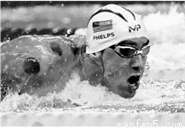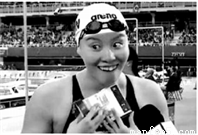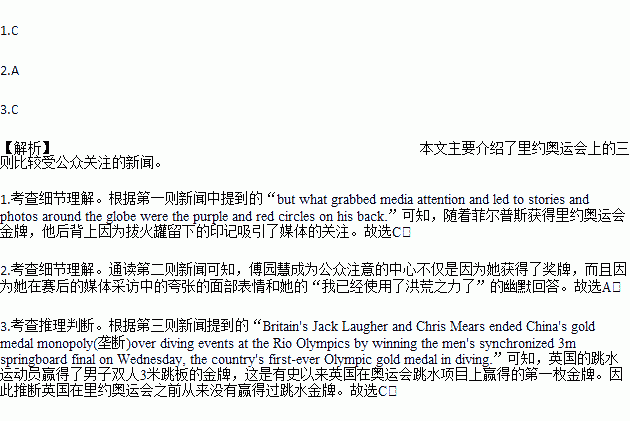题目内容
The Spotlight(公众注意的中心) in Rio
Phelps puts spotlight on cupping(拔火罐)
Olympic gold medalist Michael Phelps fed American swimmers to 8 gold medals in the 4 × 100-meter relay, but what grabbed media attention and led to stories and photos around the globe were the purple and red circles on his back.
Michael Phelps of the USA is seen with red cupping marks on his shoulder as he competes during the 2016 Rio Olympics men’s 200m butterfly in Rio de Janeiro, Brazil, Aug 8, 2016.

Chinese swimmer Fu Yuanhui goes viral
China’s women’s swimmer Fu Yuanhui has created a hit online not just by winning the bronze medal in the 100m backstroke competition, but also by her facial expressions during the post semi-final interview with China Central Television (CCTV) on Monday.
When asked whether she held back for the final, Fu replied “No, I used my ‘prehistorical power (洪荒之力)’” What she meant was that she had spared no efforts in the semi-final. Since then, the so-called “prehistorical power” has gone viral and become a new Internet meme.

Britain wins first Olympic diving gold in men’s synchronized 3m springboard(男子双人3米跳板)
Britain’s Jack Laugher and Chris Mears ended China’s gold medal monopoly (垄断) over diving events at the Rio Olympics by winning the men’s synchronized 3m springboard final on Wednesday, the country’s first-ever Olympic gold medal in diving.
Laugher and Mears finished with a six-round total of 454.32 points, just 4.11 points ahead of silver medalists Mike Hixon and Sam Dorman of the USA at the Maria Lenk Aquatics Center. China’s Cao Yuan and Qin Kai took the bronze with 443.70 points.

1.What attracted media attention with Phelps’ winning the gold medal?
A. His scars on his back.
B. His great leadership.
C. The cupping marks on his back.
D. His achievements made in the men’s 200m butterfly.
2.Which of the following is NOT the reason why Fu Yuanhui became the spotlight?
A. Her devotion and determination to swimming.
B. Her achievement in the 100m backstroke competition.
C. Her facial expression during the post semi-final interview.
D. Her humourous reply to the reporter—the so-called “prehistorical power”.
3.What can we learn from the third news?
A. China didn’t win any medals in diving events at the Rio Olympics.
B. Mike Hixon and Sam Dorman of the USA took silver with 447.81 points.
C. Britain had never won the Olympic diving gold medal before the Rio Olympics.
D. Britain became the gold medal monopolist (垄断者) of diving events at the Rio Olympics.
 直通贵州名校周测月考直通名校系列答案
直通贵州名校周测月考直通名校系列答案

 omic times are focusing on improving their outer beauty, though at a discount price.
omic times are focusing on improving their outer beauty, though at a discount price.